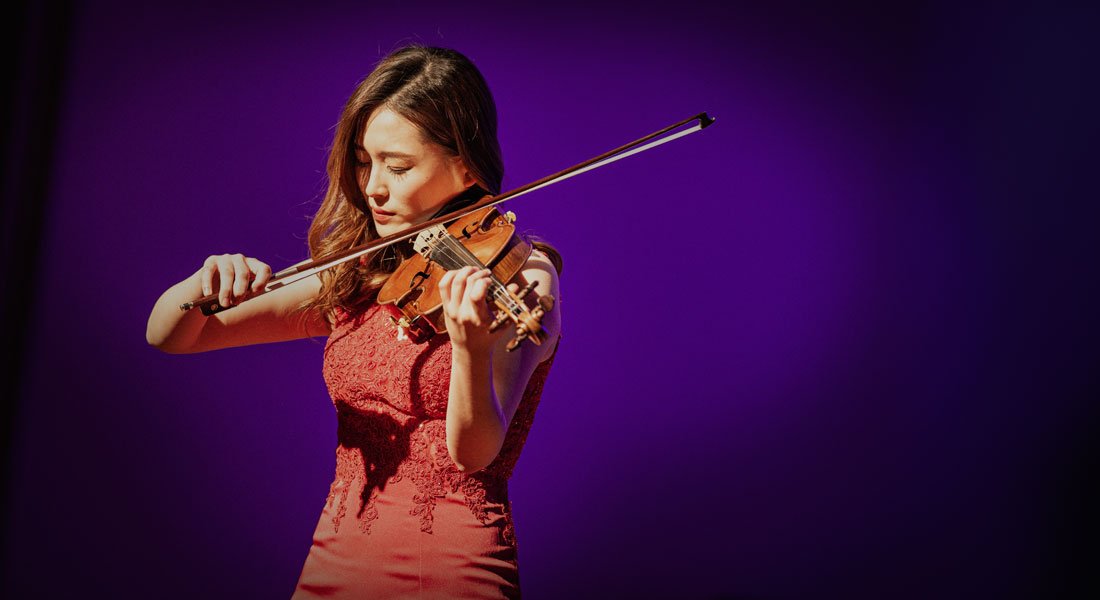Diane Huh – Chiron’s Young Artist of 2019
The Sibelius Violin Concerto was written for the virtuoso its composer was unable to become. Sibelius’ first love was performance, but, lacking technical mastery with the violin, he instead wrote the music he would have wished to play, passionate and wild, defining a Nordic landscape of cliffs and depths, glaciers and lava.
Diane Huh, who in 2019 took a group of prizes never before won by a single person in a single year, is the kind of virtuoso Sibelius was writing for, and his concerto is her favourite piece.
Diane grew up in Korea in a musical family. She began to learn the violin at the age of seven after her grandfather gave her a toy violin to brighten a stay in the hospital, but she has seriously pursued that instrument instead of any other because of its versatility: suited to solo, chamber, and symphonic music, she knew the violin would offer her the kind of opportunities she wanted.
At the age of 12, she moved with her parents to New Zealand, and found her current teacher, Stephen Larsen; according to Stephen, she was reserved, speaking little English at that time. She was fun to teach, he says, and it was rewarding to watch her emerge from her shell and start laughing at jokes; rewarding, too, to help her build, upon what was already a strong technical grounding, her fluidity and musical ideas – both of which lent themselves to Romantic music.
The Sibelius concerto is now her favourite, not only for its Nordic flavour of Romanticism but for where she has taken it. As a member of the Korimako Trio, she won the Royal Overseas League Chamber Music Scholarship in 2017. The scholarship is awarded based on both performances and on interviews with the performers about their aspirations. In both fields, the Trio demonstrated lively and cohesive ambition. Their prize was an all-expenses-paid trip to Britain, where Diane was able not only to perform herself and to attend a diverse range of concerts but to work intensively on her own playing with a number of highly-regarded music professors and their wide range of perspectives. She began to learn the Sibelius at that time.
Her 2019 successes began with winning the National Concerto Competition in March – a competition which rewards the specific skills involved in standing out against an orchestra, in this case, the Christchurch Symphony. The next month she won the University of Auckland Graduate Gala competition, also with the Sibelius, and took the Auckland Philharmonia Orchestra’s Young Soloist of the Year prize, going on to perform Ravel’s Tzigane with the APO in multiple concerts. Before getting to that, though, she had to win the Michael Hill International Violin Competition NZ Emerging Artist Award. In October she and her quartet won the University of Auckland Chamber Music Competition, and in November, she won Best NZ String Player at the Gisbourne International Music Competition. This last, requiring the broadest repertoire of all the competitions, makes it clear that though the landscape of Romantic music is close to her heart, it is not the only landscape she can travel through, or describe with skill.
She crowned 2019 with her November graduation from The University of Auckland with an Honors degree in Music.
Of these many achievements, the one she is most proud of and pleased with is the Michael Hill, both because that competition is a landmark visible from everywhere in New Zealand’s, and indeed the world’s, music scene, and because it offers as a prize an opportunity to attend the Rome Chamber Music Festival, where she expects to learn as much as she once did in the U.K.
The Sibelius is a special piece for her, she says, because she’s been living with it and learning it for so long because it’s tied to so many memories of the teachers she learned it with, the musicians she played it with, the successes she’s had with it.
During the first months of 2020 she has been learning German in preparation for postgraduate study abroad, and, as always, practising hard. The piece she has her sights on next is the Korngold Violin Concerto in D major, which she preferred not to describe to me without having finished learning it. The piece is powerful and beautiful, she says, but any other description would be misleading. She can’t yet know what she will take from the study, what articulation she will give the piece, what memories she will tie it to.
– Written by Jack Larsen

